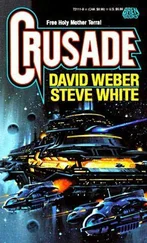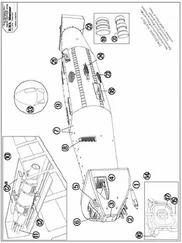David Weber - At All Costs
Здесь есть возможность читать онлайн «David Weber - At All Costs» весь текст электронной книги совершенно бесплатно (целиком полную версию без сокращений). В некоторых случаях можно слушать аудио, скачать через торрент в формате fb2 и присутствует краткое содержание. Жанр: Фантастика и фэнтези, на английском языке. Описание произведения, (предисловие) а так же отзывы посетителей доступны на портале библиотеки ЛибКат.
- Название:At All Costs
- Автор:
- Жанр:
- Год:неизвестен
- ISBN:нет данных
- Рейтинг книги:3 / 5. Голосов: 1
-
Избранное:Добавить в избранное
- Отзывы:
-
Ваша оценка:
- 60
- 1
- 2
- 3
- 4
- 5
At All Costs: краткое содержание, описание и аннотация
Предлагаем к чтению аннотацию, описание, краткое содержание или предисловие (зависит от того, что написал сам автор книги «At All Costs»). Если вы не нашли необходимую информацию о книге — напишите в комментариях, мы постараемся отыскать её.
At All Costs — читать онлайн бесплатно полную книгу (весь текст) целиком
Ниже представлен текст книги, разбитый по страницам. Система сохранения места последней прочитанной страницы, позволяет с удобством читать онлайн бесплатно книгу «At All Costs», без необходимости каждый раз заново искать на чём Вы остановились. Поставьте закладку, и сможете в любой момент перейти на страницу, на которой закончили чтение.
Интервал:
Закладка:
"And what about Harrington, Boss?" DeLaney asked quietly, when he paused.
"Harrington's probably the most dangerous of the lot," Tourville said, "and not just because we know Eighth Fleet's reequipped with at least some of the new missiles. She's got more actual combat experience than D'Orville or Kuzak, and she's sneaky as hell.
"But what's happening out at the Junction is tempting me to hope we filled an inside straight on the draw. If Eighth Fleet had been in position to intervene, Kuzak wouldn't be coming through the Junction; Harrington would, and we'd have had two or three of her battle squadrons ripping our ass off already. Assuming of course that Admiral Chin didn't have a little to say about it. So it's beginning to look as if Eighth Fleet really may be off on an operation of its own. I'm not planning on counting on that just yet-there could be any number of other explanations-but that's not going to keep me from hoping."
"I think I agree with you, Boss," DeLaney said, then chuckled. "I know Beatrice Bravo was specifically planned to mousetrap Eighth Fleet, and I guess I ought to be disappointed if we're not going to get it, too. But having seen what the lady can do, I'll be just delighted if 'the Salamander' is somewhere else while we're taking on the Manty home system's defenses!"
"I'm tempted to concur," Tourville agreed. "Taking out Eighth Fleet on top of everything else would certainly be a deathblow, but even with Eighth Fleet intact and Harrington to run it, the Manties are done if we take out this system's shipyards and both of the fleets they have defending them."
"We're coming down on sixty-five and a half million kilometers, Sir," Commander Adamson said.
"Thank you, Frazier."
Lester Tourville drew a deep breath. Eight minutes had passed since Adamson first informed him that they were into MDM range of the Manties. Second Fleet was still nineteen minutes short of its projected turnover point, but the range couldn't keep dropping forever without the Manties firing. The range between the two fleets had already fallen to 65,767,000 kilometers. Second Fleet's velocity was up to 20,866 kilometers per second; Home Fleet's was 19,923 KPS, and they'd closed the range between them by almost seventy-seven million kilometers. Tourville was still better than 98,835,000 kilometers from Sphinx, but from his current base velocity, his MDMs' range against the planet was almost 72,030,000 kilometers. The Manties weren't going to let him get much closer unchallenged.
"Open fire, Frazier," he said.
The first missile impeller signatures began to speckle the plot, and Sebastian D'Orville drew a deep breath as the first, massive salvo streaked towards his command. Obviously, they had had a lot of pods on tow, he thought as he contemplated its numbers. More than he'd thought they had tractors for, actually. But their first salvo would be the least accurate against his EW, he reminded himself. And in the meantime, he had a few missile pods of his own.
"Engage as specified, Captain Gwynett," he said formally and watched his own missile's icons streaking outward across the plot.
That was when the enemy launched his second impossibly dense salvo.
Sebastian D'Orville's forty-eight pre-pod superdreadnoughts carried 27,840 pods externally, and theoretically, they could have deployed all of them in a single massive wave. In fact, Home Fleet carried a total of almost forty-nine thousand pods, with well over half a million missiles. Lester Tourville's slightly larger superdreadnoughts carried fewer pods, and each of those pods carried fewer missiles, because of the size penalty their bulkier MDMs imposed. So although he had two and a half times as many ships, he had barely twice as many pods, and each of those pods carried seventeen percent fewer missiles. He actually had "only" sixty-four percent more total missiles than Home Fleet.
But Lester Tourville also had Shannon Foraker's "donkey," and that meant every one of Sebastian D'Orville assumptions about the number and size of the salvos he could throw was fatally flawed. And what else he had was far more control channels for the missiles he carried. Not all of the forty-two Manticoran, Grayson, and Andermani SD(P)s confronting him were Keyhole-capable. Still, the majority of them were, and the pod-layers as a group could simultaneously control an average of four hundred missiles each. But the older, pre-pod ships could control only a hundred apiece, whereas each of Tourville's ships had control links for three hundred and fifty missiles, and by using Shannon Foraker's rotating control technique, they could increase that number by approximately sixty percent. So whereas Home Fleet could effectively control a total of just under twenty-two thousand missiles per salvo, Second Fleet could control eighty-four thousand without rotating control links. Worse, it could have increased that total to almost a hundred and thirty-five thousand, if it was prepared to accept somewhat lower hit probabilities, and the "donkey" meant Tourville could actually have deployed the pods to fire that many.
Manticoran fire control was better, Manticoran electronic warfare capabilities and penetration aids were better, and Manticoran MDM's were both faster and more agile. Sebastian D'Orville could confidently expect to score a significantly higher percentage of hits, but that couldn't offset the fact that Second Fleet could control over six times as many missiles. Even if Tourville's hit probabilities had been only half as good as his, the Republic would have scored three times as many hits.
It wasn't quite as bad for the Alliance as the raw numbers suggested. For one thing, deploying that many missiles and launching them without allowing their impeller wedges to cut one another's telemetry links, was a far from trivial challenge. In fact, Tourville had decided to limit himself to no more than eighty percent of his theoretical maximum weight of fire. And to clear the firing and control arcs for even that many missiles, he'd been forced to spread his squadrons and their lumpy trails of donkeys and pods more broadly than he'd really wanted to. The separation between his units, necessary for effective offensive fire control, made it more difficult for them to coordinate their defensive fire. On the other hand, Havenite counter-missile doctrine relied so much more heavily than Manticoran doctrine did on mass, as opposed to accuracy, that the sacrifice was less significant than it might have been.
Even now, no one on either side knew exactly what would happen when fleets of pod-layers this size engaged one another. There was simply no experiential meterstick, because no one had ever done it before. For that matter, no battle in history had yet seen almost three hundred and fifty superdreadnoughts of any kind engage in what could only be a fight to the death. Over the centuries, tactical formalism had become the rule, with indecisive battles and limited losses. That might have changed, at least in this corner of the galaxy, but even here, most of the combatants were still feeling their way into the changing realities of interstellar carnage.
The Battle of Manticore would be something new and unique in the annals of deep-space combat. Everyone in both fleets knew that.
But that was all they knew as the missiles began to launch.
The range at launch was 65,770,000 kilometers. Flight time for Home Fleet's faster MDMs was 7.6 minutes, and their closing speed as they streaked into Second Fleet's teeth was 246,972 kilometers per second. Second Fleet's slower missiles took fifteen more seconds to reach their targets, and had a closing speed of "only" 237,655 KPS.
At those speeds, both sides' defenses were stretched to and beyond the theoretical limits of their capabilities. Manticore's longer-ranged counter-missiles, and the greater capability of the Katanas' in the fleet defense role, gave D'Orville's ships a significant advantage, but nota big enough one. Not the one he'd anticipated against the weight of fire he'd expected.
Читать дальшеИнтервал:
Закладка:
Похожие книги на «At All Costs»
Представляем Вашему вниманию похожие книги на «At All Costs» списком для выбора. Мы отобрали схожую по названию и смыслу литературу в надежде предоставить читателям больше вариантов отыскать новые, интересные, ещё непрочитанные произведения.
Обсуждение, отзывы о книге «At All Costs» и просто собственные мнения читателей. Оставьте ваши комментарии, напишите, что Вы думаете о произведении, его смысле или главных героях. Укажите что конкретно понравилось, а что нет, и почему Вы так считаете.












